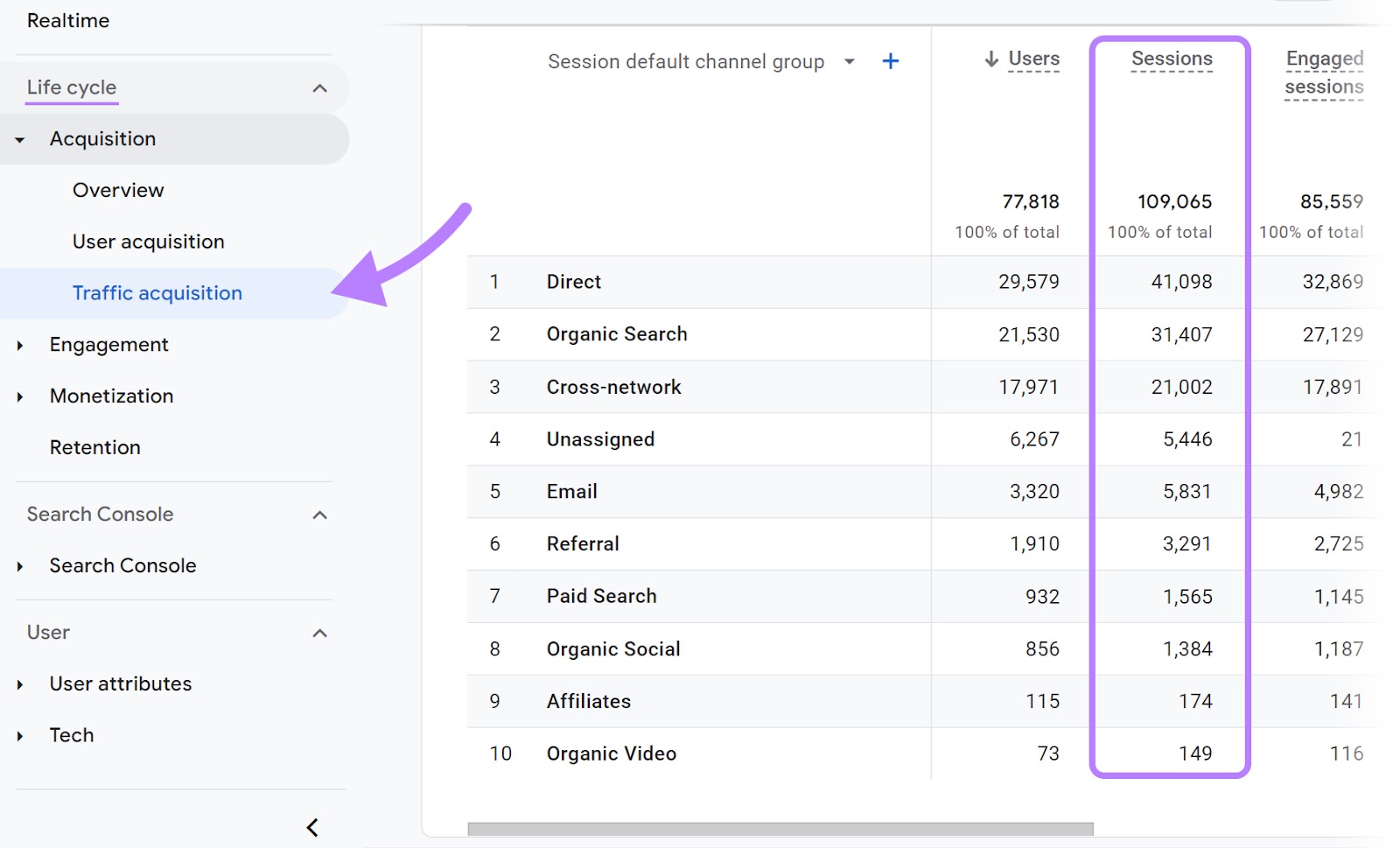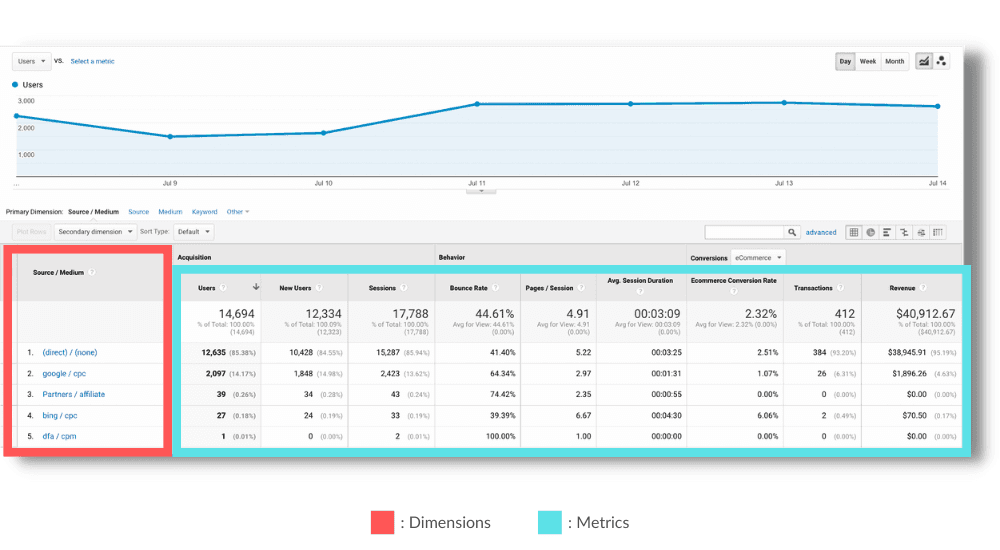What Is a "Metric" in Google Analytics? Discover Its Meaning and How It Aids Action Success
What Is a "Metric" in Google Analytics? Discover Its Meaning and How It Aids Action Success
Blog Article
Optimize Your Approach Utilizing Powerful Google Analytics Metrics
In the world of digital marketing, the usage of durable Google Analytics metrics holds the key to unlocking important insights that can propel your strategic endeavors to new elevations. Comprehending the elaborate information of user habits, conversion rates, and web traffic sources is simply the tip of the iceberg when it comes to leveraging Google Analytics successfully.
Recognizing Audience Habits
When delving right into the world of Google Analytics metrics, among the crucial aspects to understand is understanding target market habits - what is a “metric” in google analytics. Audience actions refers to just how users interact with a site or on-line material. By assessing this information, companies can get valuable insights into their target preferences, habits, and demographics
Google Analytics provides a wide range of information on audience behavior, consisting of metrics such as the number of visitors, their geographic area, gadgets made use of, and the web pages they go to most frequently. Understanding these metrics can assist organizations customize their marketing techniques, material, and user experience to much better deal with their audience.
Tracking Conversion Rates
To properly measure the success of online advertising efforts and internet site efficiency, services must concentrate on tracking conversion prices. Conversion prices indicate the percent of website visitors who take a desired action, such as buying, registering for a newsletter, or completing a call form. By tracking these conversions, services can assess the performance of their marketing projects, site material, and user experience.

In addition, companies can utilize Google Analytics to examine conversion funnels, which show the actions customers take previously finishing a conversion. By determining any drop-off points in the channel, services can make needed adjustments to boost the customer journey and boost conversion rates. Tracking conversion prices is vital for businesses wanting to maximize their online efficiency and accomplish their marketing purposes.
Analyzing Website Traffic Resources
One of the key aspects of recognizing on the internet efficiency and enhancing advertising and marketing approaches is evaluating web traffic resources. By diving into where your site site visitors are coming from, you can get useful insights into the effectiveness of your advertising and marketing initiatives and make data-driven decisions to boost your on-line presence. Google Analytics provides a wide range of information on the resources of your website traffic, classifying them right into channels such as natural search, direct web traffic, social networks, referrals, and paid search.
Assessing web traffic sources permits you to find recognize which networks are driving the most visitors to your site, along with which ones are leading to the highest conversions. By acknowledging these patterns, you can designate your advertising and marketing spending plan better, concentrating on networks that generate high-grade website traffic and readjusting techniques for underperforming ones (what is a “metric” in google analytics). Additionally, understanding the sources of your website traffic can assist you customize your web content and messaging to much better resonate with your target audience throughout different networks, eventually bring about enhanced involvement and conversion prices
Tracking Internet Site Efficiency
Google Analytics Metrics can provide invaluable understandings when it comes to keeping track of internet site performance. By analyzing crucial metrics such as web page load time, bounce price, and conversion prices, website owners can acquire a detailed understanding of exactly how well their website is carrying out. Page load time is a vital metric as it straight impacts customer experience and can influence bounce rates. Monitoring this metric can help recognize locations for enhancement to make sure optimum website rate.
Bounce rate is an additional crucial metric to track as it shows the percent of site visitors who leave the site after seeing only one page. A high bounce rate might recommend that the website's content or user experience needs enhancement. On the other hand, conversion prices disclose how efficient the site goes to converting site visitors into clients or leads. By checking and evaluating these metrics consistently, website proprietors can make data-driven choices to enhance their site's performance and improve individual experience.
Implementing Customized Records
Exactly how can web site owners acquire much deeper understandings into their analytics information beyond the standard reports provided by Google Analytics? Custom reports allow customers to focus on certain metrics, measurements, and segments that are most relevant to their company goals.
To create custom-made records in Google Analytics, customers can navigate to the "Customization" tab and pick "Customized Reports - what is a “metric” in google analytics." From there, they can pick metrics, dimensions, and filters to consist of in their reports. Personalized Full Article reports can vary from basic to complicated, relying on the deepness of insights called for. By utilizing customized records, internet site proprietors can uncover distinct patterns, patterns, and opportunities that may not be conveniently apparent in basic records.

Conclusion
Finally, leveraging powerful Google Analytics metrics can supply beneficial insights into target market habits, conversion prices, website anchor traffic resources, web site efficiency, and custom-made records. By evaluating these essential metrics, businesses can optimize their strategies, enhance user experiences, and drive much better results. Continual tracking and changes based on data-driven choices can lead to improved on-line visibility and boosted success in accomplishing business goals.
Comprehending the intricate details of customer habits, conversion prices, and web traffic sources is just the pointer of the iceberg when it comes to leveraging Google Analytics properly.To successfully determine the success of on-line advertising and marketing initiatives and website efficiency, businesses need to focus on monitoring conversion prices.Furthermore, organizations can utilize Google Analytics to assess conversion funnels, which reveal the steps individuals take in the past completing a conversion. By evaluating essential metrics such as page tons time, bounce price, and conversion rates, web site proprietors can gain a thorough understanding of exactly how well their website is executing.In conclusion, leveraging effective Google Analytics metrics can offer useful understandings into target market actions, conversion prices, traffic resources, site performance, and custom reports.
Report this page